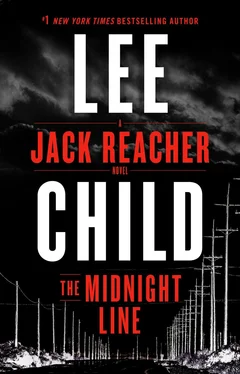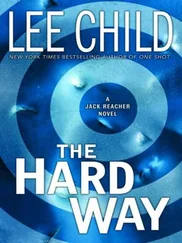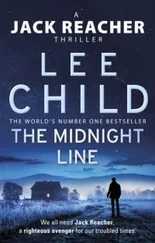“How long had he lived there?”
“Five years, maybe.”
“Did any of the neighbors ever take a wild-ass guess about what he did for money?”
“That would enter the realm of gossip.”
“I guess it would, technically.”
“We figured he already had plenty. We figured he was a rich guy from out of state, come to find himself. We get those, from time to time. Maybe they’re writing a novel.”
—
At that moment three hundred miles away in Rapid City, South Dakota, the clerk behind the deli counter in the convenience store was finishing up making change for a BLT and a diet soda, and then picking up the phone, and dialing the police department.
He said, “Excuse me, I think you have a woman detective working for you. An Oriental person. Or Japanese-American. Or Asian, or whatever it’s supposed to be now. I need to speak with her.”
The call was transferred, and a voice said, “Property, Nakamura.”
“This is the guy from the convenience store. On the corner by Arthur Scorpio’s laundromat. I got something I figure I need to tell you before you find out for yourself and get mad at me.”
“What kind of something?”
“Arthur Scorpio just came in.”
“And?”
“He bought another phone.”
“How long ago?”
“Five minutes.”
“Which phone?”
“First one off the left peg.”
—
Also at that moment, Arthur Scorpio was dialing Billy in Wyoming again. Again there was no answer. Just voicemail.
Scorpio said, “Billy, this is Arthur. I need to hear from you. You’re making me worried now. What’s with not answering your phone all the time? And you got that guy coming. Plus maybe another guy. We just got a message from Montana. They sent a rider down especially. They have a Fed up there asking questions. He just left Billings. We don’t know where he’s headed next. Eyes open, OK? And call me back. Don’t make me worried, Billy.”
He clicked off and dropped the phone in the trash basket.
—
Bramall’s phone dinged. Reacher figured it was a text message. He was getting to where he could tell the difference. The woman in the faded red dress got up and started to gather the empty lemonade glasses.
Bramall read his message.
Twice.
He said, “Ma’am, the lemonade was delicious, but I’m afraid we really have to get going now.”
Then he just stood up and hustled out the door. Reacher shrugged at the woman, palms up, as if in puzzlement. Another universal gesture. Yeah, I know, but I better go with my crazy friend . He followed Bramall outside, and across the dirt, to the car.
He said, “What’s up?”
Bramall said, “Mrs. Mackenzie is dissatisfied with progress so far, and informs me she’s going to Wyoming to search certain places near the old family homestead herself. Apparently she’s reconsidering her opinion her sister would never go back there.”
“Doesn’t she know you’re only sixty miles away?”
“No,” Bramall said. “I never tell clients where I am.”
“Why not?”
“I like to build up the mystery.”
“You can take the boy out of the FBI.”
“We need to get there first.”
“When is she leaving Chicago?”
“She’ll charter a plane. She has a card. We should go there now. We should have gone there first. But I was told Sanderson would never return. Now we’re saying maybe she did? Terrific. Maybe she’s been there all along. It’s a two-hour drive. Nothing for Porterfield to complain about.”
—
Sheriff Connelly had said a government agency would call him first, before entering on his territory. At least as a courtesy. Which is exactly what happened. He got back from his impromptu trip out to the old Porterfield place, and two minutes later his phone rang with a field agent from the federal DEA. The guy said he was heading south from Montana, and sooner or later was going to be passing through the county, nothing much in mind, maybe stopping in one or two places, but overall nothing for anyone to get concerned about. He said he didn’t require assistance or any other courtesies, but thank you very much for asking. Then he hung up.
—
There was a big difference between crows flying and cars driving. To get across the Snowy Range, first they had to go back to the dirt road, and then back to Mule Crossing itself, and past the old post office and the bottle rocket store, and all the way back to Laramie, all in order to pick up a different westward route, which started with a left turn about four blocks north of the bar with the bullet hole in the mirror. Then the trip started all over again at zero. Still seventy miles to go. Reacher told Bramall to look on the bright side. More hours on the invoice. Bramall told a joke about a lawyer who died and got to the pearly gates. Not fair, he said. I’m only forty-five. Saint Pete said no, we got a new system. Now we do it by billable hours. According to our records you’re 153.
They passed a sign that said the road would close pretty soon for the winter. And then it started to rise, into the mountains, up over ten thousand feet, into thin and glittering air. The Toyota slowed a little, but it kept on going, winding through rocky gaps and around sparse copses of wind-stunted trees, across what already felt like the roof of the world. Then the road held level through a wide half-mile curve, and started to fall again, through the same type of gaps and around the same type of trees, and the Toyota started rolling faster and faster, under its own weight, with no gas at all.
Thirty miles later the navigation screen showed a thin tracery of ranch roads, two on the north side, and two on the south. Beyond them was blank.
“Is that it?” Reacher asked.
“I think so,” Bramall said. “Apparently one of the ranches is bigger than the other three. That’s the old homestead. The others came later.”
“Did the sisters inherit?”
“No, the place was sold when they were in college. The parents moved out. New owners moved in. And so on. The same with the other three places, I’m sure.”
“You think she’s squatting in one of them?”
“I doubt a person who has to pawn her ring is paying rent.”
“Why would they be empty?”
“Rural real estate often is. Places shrivel and die. Especially when the neighborhood royalty moves out.”
“Is that your description, or Mrs. Mackenzie’s?”
“A little of both. Their father was a judge, which back then in a place like this made him the most important man in the county. Everything came through the courts eventually. Mrs. Mackenzie seems aware of that.”
“Why did the parents move out?”
“Mrs. Mackenzie had a hard time explaining. I’m sure we could speculate. I’m sure as kids they both had ponies. On a judge’s salary.”
“I’m sure all Wyoming kids have ponies. There are more ponies than kids.”
“It was a metaphor. For little arrangements that work great, until they don’t. Then sometimes you need to get out of town and start over.”
“Is that how Mrs. Mackenzie remembers it?”
“She was in college at the time. In the end she credits George W. Bush. She claims it was an entrepreneurial thing. The old man was moving from the public sector to the private.”
“To do what exactly?”
“No one knew exactly, except they noticed it stopped the day after the banks crashed.”
“Where is the old boy now?”
“Dead soon after.”
“Mom?”
“Also dead. But much more recently. Still raw.”
“Hence the sudden worry about her semi-estranged twin.”
“Exactly,” Bramall said. “Now her semi-estranged twin is all she’s got.”
—
They had no way of knowing which of the tracks led to the largest ranch, because they all ran far out of sight into the invisible distance, so they tried to judge by width or construction or other hint of architectural grandeur. In the end they agreed one track was wider than the others. Possibly the surface was better. There were piles of rocks that might once have been ceremonial gateposts. Like the archaeological remains of a once-mighty palace.
Читать дальше












